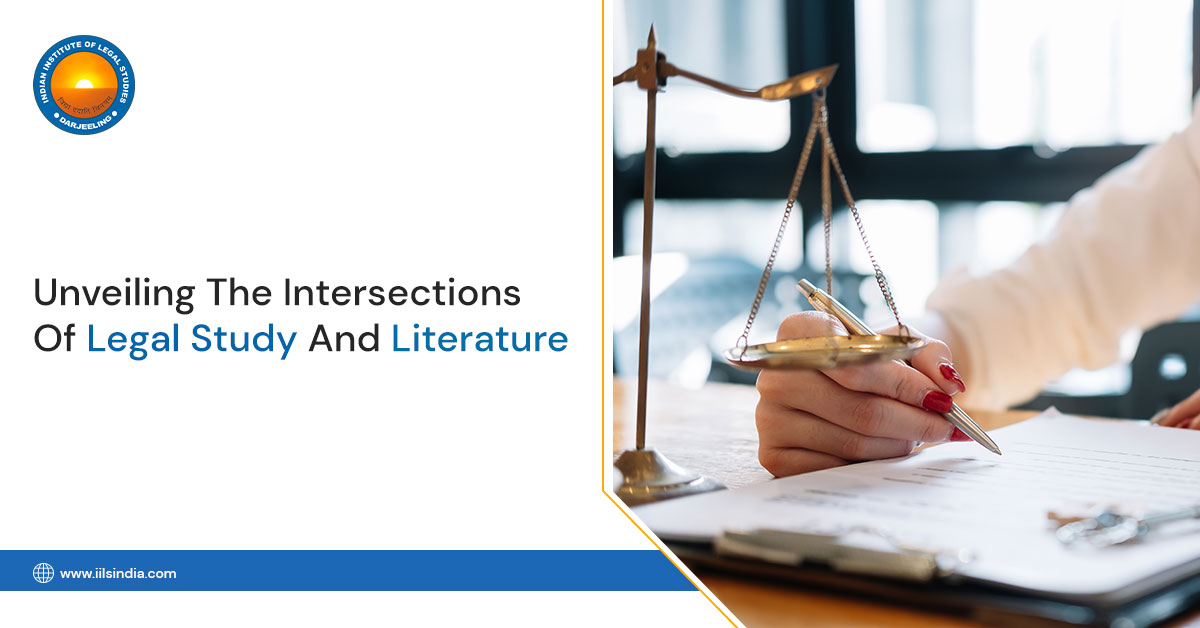Abstract: Exploring the Relationship between Legal Study and Literature from Critical Perspectives.
Law study in West Bengal can be a great option for the students who are passionate about pursuing a career in law or legal studies. There are several law colleges in West Bengal that offer quality education in law and Indian Institute of Legal Studies Cooch Behar is one of them. In the B.A.LL.B. (Hons.) Course, English literature and language has significant place. This involvement gives us opportunity to discuss further on the question how literature and law are interconnected.
Law and Literature being two separate fields of Studies are closely related. Both Law and Literature deal with the issues of human behavior, societal norms, and justice system. Literature often explores ethical and moral dilemmas through complex characters and intricate plots, while Law provides a framework for resolving conflicts and enforcing rules. One of the primary ways in which literature and law are linked is through the use of storytelling. Literature and Law rely heavily on narratives to convey meaning and shape perceptions. In Literature, authors use stories to explore human experience, to examine the complexities of morality, and to challenge readers’ assumptions about the world. Similarly, in Law, attorneys and judges use narratives to present evidences, build arguments, and to convince juries of their positions.
Sometimes, legal writing is often considered as a form of literature. Legal opinions, briefs, and arguments are written with a precision of language and a sense of rhetorical flourish that is similar to that found in literature. Just as authors use language to create vivid imagery and evoke emotions in readers, lawyers use language to persuade judges and juries and to shape public opinion. Another area in which literature and law intersect is in their shared interest in questions of justice and morality. Literature often explores ethical dilemmas, presenting complex characters whose actions and motivations are morally ambiguous. Similarly, law is concerned with issues of right and wrong, and seeks to establish a framework for enforcing moral and ethical principles in society.
Furthermore, literature has played an important role in shaping legal discourse and reformation of laws. For example, works such as Harriet Beecher Stowe’s “Uncle Tom’s Cabin” and Upton Sinclair’s “The Jungle” have been credited with helping to spark social and political movements aimed at reforming laws and practices that were seen as unjust or oppressive. Similarly, legal scholars and practitioners have drawn inspiration from literature in their work, citing works such as Shakespeare’s plays as sources of insight into human nature and the law.
Law has also been an important subject of literature, particularly in works of crime fiction and legal thrillers. Such works often explore the complexities of the legal system, including issues of power, corruption, and the pursuit of justice. They also offer a window into the minds of lawyers and judges, showing the ways in which they approach legal questions and the moral and ethical dilemmas they face in their work. Legal texts themselves can be seen as a form of literature. For example, legal codes and constitutions often contain elements of poetry and rhetorical flourish, and are written with an eye towards both clarity and beauty of language.
In conclusion, it can be said that literature and law are inextricably linked. Both fields rely on narrative to convey meaning and shape perception, and both are concerned with questions of justice and morality. Literature has played major role in shaping legal discourse and reforming it, while law has been a subject of literature, particularly in works of crime fiction and legal thrillers. By understanding the ways in which literature and law intersect, one can gain a deeper appreciation for the complexity of human experience and the role that both literature and law play in shaping people’s understanding of the world around. Hence, there is a considerable scope of interdisciplinary research on Law study in West Bengal connecting with English literature.

